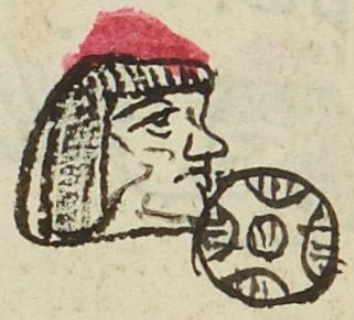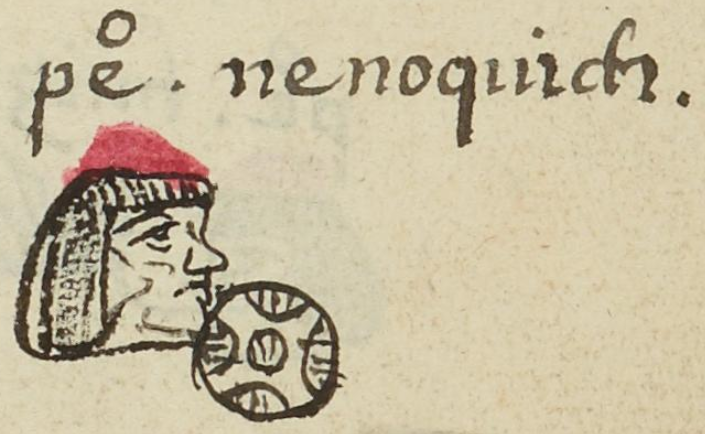Nenoquich (MH677v)
This black-line drawing of the compound glyph for the personal name Nenoquich (“Man Born in the Five Extra Calendar Days”) is attested here as a man’s name. The glyph shows a shield, which is semantically representative of bravery, manliness (oquichtli). The shield is very close (nenahuac) to the tribute payer. Nothing visual suggests a calendrical association. There are five down feather balls (probably tlachcayotl) arranged in a quincunx pattern of feathers called ihuiteteyo, which had an association with Tenochtitlan.
Stephanie Wood
This seems to be a war shield of the ihuiteteyo design, discussed by Frances Berdan and Patricia Anawalt (The Codex Mendoza, 1992, vol. 1, Appendix G). It can come in different colors. Sometimes the symbols on this design are taken for shells. An article by Ian Mursell in Mexicolore and citing the same authors, reminds us that they are down balls, which have associations with death. He also paraphrases John Pohl, saying that the war shield was very personal, it "represented the warrior’s soul, and would generally be burned at the funeral of a dead man." We also learn from The Codex Mendoza: New Insights (2022, 24), that "the tlacuiloque drew and painted a total of eleven ihuiteteyo, one for each one of the rulers of the city."
The five extra days in the calendar of 360 days (xiuhpohualli) were called nemontemi (useless days). It was unlucky to be born on these days. A man who was born in this period was called nenoquich and a woman was called nencihuatl. This is explained in the Florentine Codex in Book 2, folio 12 recto (see: https://florentinecodex.getty.edu/book/2/folio/12r). These individuals were considered unlucky, ill-fated, and even useless. A great many individuals in the Matrícula de Huexotzinco have names beginning with the negative syllable Nen-. Perhaps they were born in that ill-fated period, or perhaps the negative syllable came to be even more liberally applied. With men, for instance, Nentequitl (perhaps a lazy worker) was much more common than Nenoquich. When presented visually, the nen- syllable could derive from nenetl (a figure or sculpture of a deity or a doll). Nenetl also had an association with women’s genitals, which has caused much speculation about a negativity associated with women and their sex, but that might have come from European religious influence. In the colonial context, such concepts and perceptions could become muddied.
Stephanie Wood
1560
Jeff Haskett-Wood
sin suerte, nemontemi, calendarios, nombres de hombres

nenahuac, side by side, https://nahuatl.wired-humanities.org/content/nenahuac
oquich(tli), a man, manliness, courage, bravery, https://nahuatl.wired-humanities.org/content/oquichtli
Nenoquich, ill-fated, unlucky man
Hombre Deasfortunado, u Hombre Flojo
Stephanie Wood
Matrícula de Huexotzinco, folio 677v, World Digital Library, https://www.loc.gov/resource/gdcwdl.wdl_15282/?sp=435&st=image.
This manuscript is hosted by the Library of Congress and the World Digital Library; used here with the Creative Commons, “Attribution-NonCommercial-ShareAlike 3.0 License” (CC-BY-NC-SAq 3.0).






